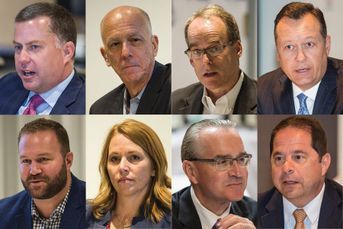President Trump’s order on DOL fiduciary rule creates quandary for firms
President Donald J. Trump left the financial advice industry in no-man’s land when he issued…
President Donald J. Trump left the financial advice industry in no-man’s land when he issued his directive to the Department of Labor to review its fiduciary rule, due to be implemented in April.
The regulation would require financial advisers to act in the best interests of clients when dealing with retirement accounts. Critics of the industry claim the current “suitability” standard for broker-advised retirement accounts costs clients too much in commissions and leaves them vulnerable to being sold investments that deliver more to the broker than the client. Supporters of the current standard argue that forcing all firms to act as fiduciaries will raise the cost of investment advice beyond the reach of those with small accounts.
Mr. Trump’s directive leaves many firms in a quandary: Should they continue to change procedures to meet the requirements of the rule or halt those efforts in the hope it will be amended or even withdrawn?
Large firms with the resources, such as Merrill Lynch, have fully committed to adopting the fiduciary standard. Many smaller firms would like the rule to go away, or be delayed and modified.
DELAYED IMPLEMENTATION
Mr. Trump’s directive instructed the DOL to prepare a new analysis to determine if the rule would make it more difficult for investors to get advice, disrupt the industry or cause an increase in litigation. Such an analysis would take several months.
The Labor Department is seeking a delay of the April 10 implementation deadline to conduct the review. If the agency finds harm, it can modify or replace the measure through a rulemaking process that also would take months, delaying implementation of any rule even further.
The best course for advisers would seem to be to continue with their current strategies. Those firms like Merrill Lynch that have decided to adjust to the rule should continue with that business model and hope they are correct. They have invested large amounts in systems to handle the new approach, and halting now would throw away that investment while the outcome is still unclear.
(Related read: The latest news and resources on the DOL fiduciary rule)
Those who decide to wait and see in hopes that the new administration, the Republican-controlled Congress or court challenges will kill the rule, should be prepared to move quickly to make changes to give fiduciary advice should it not die. Waiting seems the riskier approach, given the recent Texas court decision upholding the rule. At this point, the rule is effective.
Even if the reg does fall, the industry is likely to be confronted with a fiduciary rule eventually, if not from the DOL then from the SEC, which was given the authority by Dodd-Frank to promulgate such a rule. The SEC so far has dragged its heels in developing the rule, in part because it was engaged with other issues.
LITTLE MOVEMENT
Last May, the SEC’s regulatory agenda said the agency hoped to propose its fiduciary rule by this April, though there has been little apparent movement toward developing the measure. No doubt the timetable has been thrown into disarray by the election result and the departure of SEC Chairwoman Mary Jo White and two other commissioners.
(More: Outgoing SEC Chairman Mary Jo White hopes successor picks up fiduciary mantle)
The nominee to be the next SEC chairman, Jay Clayton, will be hard-pressed by Democrats in the Senate on his stance on the issue of the fiduciary rule during the hearings on his nomination. Since he is a Wall Street lawyer, Democrats are suspicious that he will be soft on the financial industry.
Meanwhile, there is anecdotal evidence customers are beginning to recognize the fiduciary issue for themselves. Several advisers at the TD Ameritrade Institutional conference two weeks ago, for example, mentioned to InvestmentNews staff that prospects they meet now ask them right off the bat if they are a fiduciary. One or two years ago, they were never asked that. Some also admitted that though they support the DOL rule, their businesses will benefit if it goes down and the distinction between their fiduciary standard and brokers’ suitability standard remains.
Whatever the outcome of the DOL rule, all those who advise investors should be providing that advice based solely on the best interests of their clients. If all advisers had been doing so already, there would have been no need for a mandate in the first place.
Learn more about reprints and licensing for this article.








